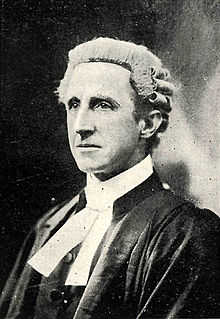Albert Piddington
| Albert Piddington | |
|---|---|

Piddington, c. 1907
|
|
| Justice of the High Court of Australia | |
|
In office 6 March 1913 – 5 April 1913 |
|
| Nominated by | Andrew Fisher |
| Preceded by | none |
| Succeeded by | Sir George Rich |
| Personal details | |
| Born | 9 September 1862 Bathurst, New South Wales Australia |
| Died | 5 June 1945 Mosman, New South Wales, Australia |
| Children | Ralph Piddington |
Albert Bathurst Piddington (9 September 1862 – 5 June 1945) was the shortest serving Justice of the High Court of Australia, and never sat on the High Court bench. Appointed on 6 March 1913, he resigned on 5 April after opponents questioned his independence.
Piddington was born on 9 September 1862 in Bathurst, New South Wales. He was educated at Sydney Grammar School, and then studied at the University of Sydney. He graduated in 1883 with a Bachelor of Arts, winning the University Medal in Classics. He was appointed a vice-warden at the university's St. Paul's College in 1884, and from 1887 was a lecturer in English at the university. About this time he also started studying law. He was admitted to the New South Wales Bar in 1890.
In 1895, Piddington was elected to the New South Wales Legislative Assembly for the electoral district of Tamworth, defeating the former Premier of New South Wales Sir George Dibbs. In 1896, he married Louisa O'Reilly; their son Ralph became professor of anthropology at the University of Auckland. He was a delegate to the second constitutional convention in 1897–1898, where he campaigned against the proposed constitution, although supporting federation in general. He retired from politics in 1898. In 1910, Piddington was elected to the council of the University of Sydney. The following year, he was appointed as a Royal Commissioner by the Government of New South Wales to inquire into labour shortages, and was appointed a commissioner again in 1913 to inquire into industrial arbitration in New South Wales. During this time he continued to practise law and was employed at Sydney Boys High School.
...
Wikipedia
